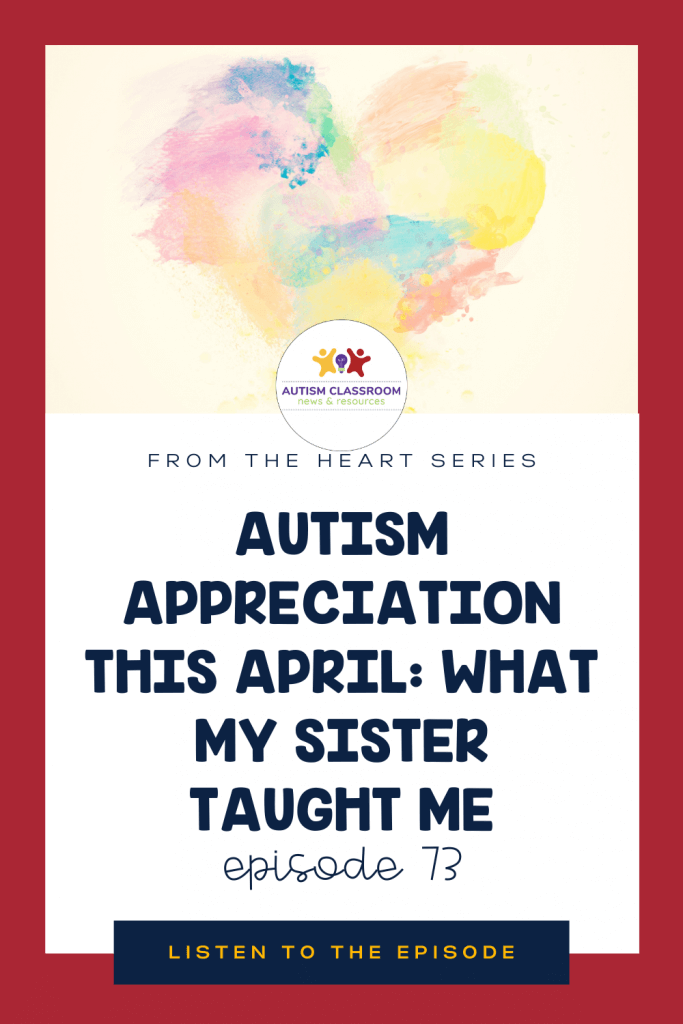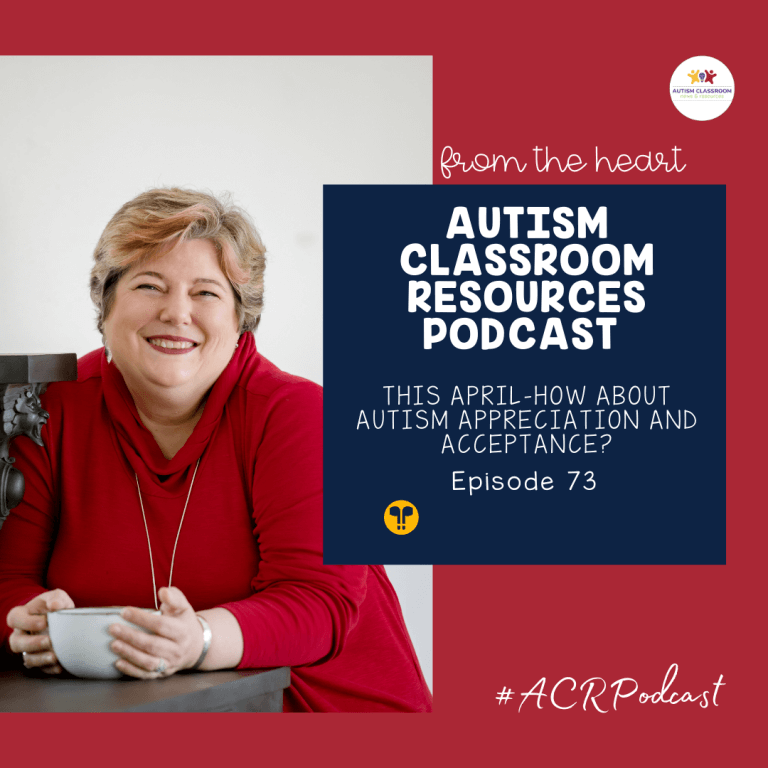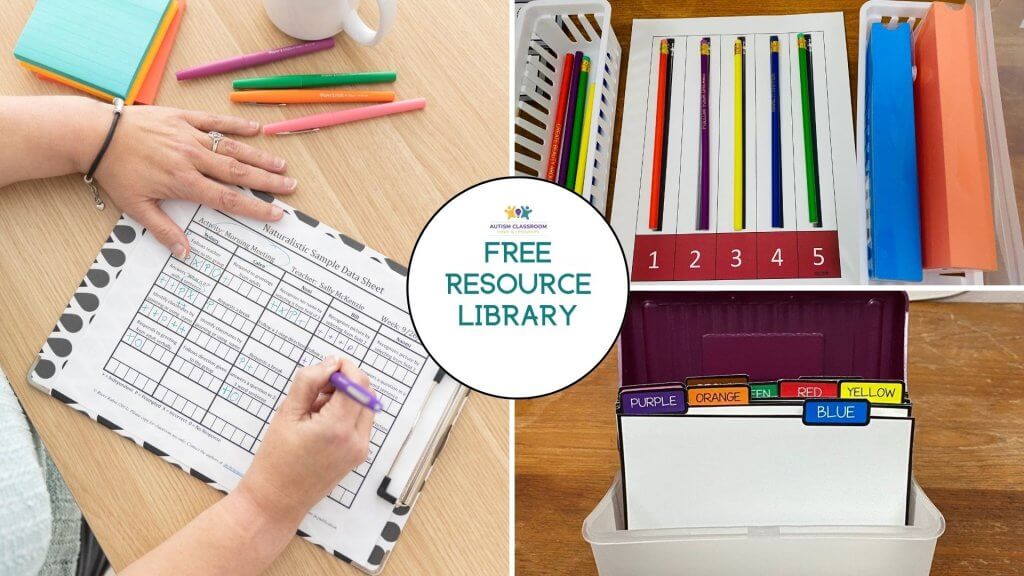Many of you may not know this, but I have a sister with autism. She’s significantly older than I am, and she doesn’t have a formal autism diagnosis. That’s because when she was young, she actually wouldn’t have qualified. She has a formal diagnosis of Cerebral Palsy but that in no way describes the issues she has.
And let me take a few moments to assure you that she knows that I talk about her when I train and talk and write. Her experience in school was not positive-and I’ll talk about that more a bit in a moment. And because of that, she supports me in trying to help educators better understand students like her.
She has a high school diploma and went through school with no assistance. She has been married for 38 years to a man who also has developmental disabilities, and they lived together semi-independently with help from our family, and then additional help the Medicaid Waiver in our state.
Why Am I Telling You About My Sister?
Why am I telling you this? Well, it’s almost April…and April is traditionally the month that we in the autism community focus on “autism awareness.” And I put that in quotes…because that’s a concept that made sense 10 or 20 years ago when no one knew what it was. But come on…I now see commercials for financial companies in which parents just talk about how they have a child with autism–the commercial isn’t about autism. It shows up on half the TV shows I watch that have nothing to do with autism. And it’s been the subject of many mainstream TV shows, for good or bad depending on your opinion. I’m thinking we are all pretty much aware of it now.
But, there are still some things that people aren’t very aware of ABOUT autism. And there are still some things that our society isn’t always very good at–like ACCEPTING, understanding, and appreciating autism. So, those are the things I want to focus on as we get ready to kick off April this year. And I’ve got some ideas of how you can help your school and community to focus on that this year.
So let’s get started….
My Sister and Autism
After that long introduction, I want to really focus on acceptance of autism this year and some things that I think we, as educators, need to do to help that happen within our schools and communities. As I mentioned, this is a topic that is pretty important to me as a sibling of someone on the spectrum.
For those of you who haven’t been around for my previous blog posts about my sister, she is older than I am. And that means that she was a child before there was really any real criteria for autism. And when criteria first came out and into the 1990s, as someone with average cognitive skills, she still wouldn’t have fit the criteria. So she wasn’t identified. And she never really fit a good criteria for what her disability was. In our family this was just who she was….it wasn’t autism, or cerebral palsy or anything else.
My Sister’s Background
To give you a little background on her, she had an average IQ and she went through school in the 60s and 70s with no supports or any real understanding of the issues she struggled with. She had some speech therapy when she was preschool-age, but no other types of support other than my family and the occasional teacher who understood her intuitively. And despite this lack of support, she had an amazing memory. She went on to graduate from high school. And she got an associates degree in accounting. She got married to someone who also had a developmental disability. They have been married for 38 years. And she lived somewhat independently with support for money management, among other things. She got that support initially from my family, and later through the medicaid waiver in our state.
How My Sister’s Experience at School Shows the Need for Autism Appreciation
But let me go back to her earlier years for a bit. Her experience in school was really pretty terrible. She was bullied pretty relentlessly, based on her reports and my family’s reports. These experiences made an indelible and horrible mark on her emotional state that has had lifelong effects on her. In addition to autism, she has issues with anxiety and depression, like more than 40% of individuals with ASD.
Now granted, that was many many years ago. But I am here to tell you that to this day, in her 60s, when anyone suggests doing anything new involving meeting new people, she refuses at first. And the first thing she says is that she did that in school and it was terrible, and she won’t do it again.
And her psychiatrist more recently made the diagnosis, that I should have realized she had, of Post-Traumatic Stress Syndrome. She essentially flashes back to those situations in school whenever she thinks about going into new social situations, which is difficult for her anyway. She can recall every one of those bullying incidents in amazing detail like it was yesterday. It hasn’t faded from her memory.
Because Bullying is Still Real and Still Devastating
So, why am I telling you about someone who went through school 50 years before the students you teach? It’s not because I want to talk about my sister. But because we have many, many students with autism who are experiencing these types of situations in our schools right now. Sometimes we know it. Sometimes we don’t. But it’s still happening.
And even if it’s not happening overtly….and I know, and truly hope, that in 50 years we have made SOME progress in this area–until we not only accept but APPRECIATE students with autism for who they are, we haven’t solved the problem. Because if students aren’t accepted and appreciated for their strengths and gifts (and all have them), then they know it no matter how sophisticated others are at hiding it.
Let’s Raise Autism Appreciation and Acceptance With #CelebratingDifferences
So, how do we address this. What if, instead of raising Awareness this April, we focused on raising appreciation and acceptance…and #celebratingdifferences. The Autism Society of America has focused their campaign on that this year and I agree. Because there’s a lot to celebrate.
And I think this ties into another thing you have and probably will see more on social media. More autism self-advocates—individuals who are on the spectrum—are speaking out about how the world sees them. They are more vocal about how they perceive Autism Awareness, Light it Up Blue, being represented by a puzzle piece and more. There has been more of a push for focusing on neurodiversity, which as we push as a society toward more inclusivity I think is a great approach. So there is some discussion about whether we should be focusing on autism as a disability.
“I am fearful, or suspicious, of generalizations… They cannot guide me reliably in making decisions about particular individuals.” –Ruth Bader Ginsbergz
And this is how I often think about anything in relation to making decisions about anything concerning individuals with autism and the autism community.
There is a lot of work to be done and there are a lot of people who have to be included and considered from children to adults on the spectrum at all different levels. And also their families and communities. My focus is on keeping the respect of the individuals at the forefront and recognizing that there is no one approach that is going to match the needs or strengths of every individual on the spectrum or their support system. So here is what I propose for this April this year.
4 Ways to Build Autism Appreciation in Your School and Community
What if, instead of talking about what autism is, we spent the month talking about the amazing things that individuals with autism bring to our society. Here are some examples of ways to do that.
- Explore what adult advocates have to say about their own autism and how they see it. Get to know what they think about how other people say and think about their autism.
- Highlight for your students and school staff individuals with autism who are well known in our society for their accomplishments. That’s not to say that these are the only individuals on the spectrum we should talk about. Instead, it’s a way to holding up individuals they may already know of and be familiar with and pointing out that they have ASD. People like the actors Anthony Hopkins and Dan Ackroyd. The creator of Pokemon, Satoshi Tajiri . Temple Grandin to name a few.
- Take #2 a step farther and have individuals from your school who have graduated and gone on to work in the community to come to school and talk about their lives and what they do. Have them talk about autism means to them.
- And finally when you do talk about autism, don’t focus only on the deficits. Are there barriers and deficits…of course. Trust me, I understand it is a disability and I am not saying we should not acknowledge that. But, I think we should also focus on some of the strengths that these individuals have. It could be something simple like my sister’s amazing memory for everything that had ever happened and every song she ever heard. Or something like her ability to focus intensely on work that others might find dull and get distracted. You won’t find a better worker for a job than her.
Focusing on the strengths of the students we teach is a huge element in the way we talk about them around them and around other students. And it makes a difference in how others perceive them. And it sends the message that they should be appreciated for these gifts that they bring.
Keep Sharing this April for Autism Acceptance
Those are just some of the ways that you can help to build appreciation and acceptance of autism within your community. I would love to hear your thoughts and ideas. I’ll include some resources for learning from our adult self-advocates who have ASD and what they think in the blog post for this episode at autismclassroomresources/episode73.
And one last thing I will say is to look for organizations that focus on listening to those on the spectrum when looking for information and where to donate support and funds. I am a big supporter of the Autism Society of America and I sit on their Panel of Professional Advisors. I do this in part because they also have a Panel of Individuals on the Spectrum. And they listen equally to both sets of advisors. And that is how it should be.
I’ll be sharing more thoughts and suggestions on my instagram and facebook feeds starting April 1. And I would love to hear about how you promote acceptance and appreciation in your schools and communities. If you are an educator, hop over and join our private Facebook group at specialeducatorsconnection.com. Answer the 3 questions and we’ll get you in to share your thoughts.
I’ll be back next week with a new episode. I hope to see you then. Until then, thank you once again for everything you do for your students.






